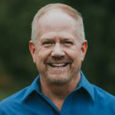A ‘Path of Life’ for Many
Content originally posted on the National Association of Evangelical’s website, written by Steven Eng. Read the original post here.
Our team’s second journey across the U.S.-Mexico border, south of McAllen, Texas, to Reynosa, Mexico, was guided by Victor Hugo Castillo, pastor of Rio Grande Bible Church McAllen, River Ministry coordinator for Texas Baptists, and freelance journalist for major Spanish- and English- speaking media outlets.
Pastor Hugo took us to Senda de Vida, currently the largest migrant shelter/camp on the South Texas and Mexico border. As we passed through the security gate, we were struck by how clean and orderly the shelter was — a campus of sorts, filled with brightly-colored, newly-constructed mobile-home-sized buildings, open-aired roofed shelters, and shared areas where people gathered and children attended school, played and sang under tarps.
Hugo began by asking us to pass out hand-held audio Bibles in Creole to those who looked like they were from Haiti, including Marvin, a well-educated Haitian who served as a translator in his country.
Next, Hugo began setting up his camera equipment to interview others, starting with Jeanette, a mother who had just arrived from El Salvador. The day before, Hugo told her, the Texas legislature passed a bill allowing Texas state troopers and local police to arrest immigrants or detain those assisting them. He then asked Jeanette, “What do you think about this new law?”
Because she had not learned about this new law, she replied, “I don’t really know, because we can be fearful of the police, even when we haven’t done anything wrong. We are not bad people. And as human beings, we are called to help one another.”
Hugo then asked Jeanette, “What do you want to do when you get to the United States?” She replied, “I’ve always said that my family is my highest priority. I want to raise my kids. I have three kids and have my mom. And really, I want to provide for them. Because for me, they are everything.”
Pastor Edward’s Story
Our team split up to talk to groups of migrants throughout the camp, visiting with people from Russia, Haiti, Guatemala, Cuba and elsewhere.
We met Edward, a pastor from Venezuela, who had documented evidence of persecution and had family waiting for him and his family in North Carolina. Determined to do things the right way, Edward’s family had received an appointment through the U.S. government’s CBP One app to meet with border officials.
“We are thanking God for this appointment. We want to find refuge. But we also want to get involved in a church. My whole family is part of our ministry — we can serve as worship leaders, preachers and instrumentalists,” Edward said.
“I’ve been a pastor for 23 years, and we did not plan to migrate. But in an instant, we had to leave. We had to put our future in the hands of God…. Since 2009 I have fought for human rights in Venezuela, for those in prison. The government asked me to serve as a mediator. So, I was the voice of those who were incarcerated — and the voice of the government,” he said.
“Other pastors and I preached the gospel, because the gospel is what changes lives. And we baptized many, saying, ‘Your future and your hope is in Jesus. Because he wants to change and transform you into a new person.’ We were able to get prisoners to turn in their arms. We were successful taking drugs out of the prisons. We eliminated fees prisoners had to pay to the government. And we reduced a lot of criminal activity within the prisons,” Pastor Edward said.
The Venezuelan government was watching. At the time, all they asked of Edward was to care for those in prison. Then the pandemic hit, and the government shut their access to the prisons for two years.
After the pandemic, Edward returned to find things were much worse. “Everything we had fought for, for a long time — to reduce the amounts of drugs in prison, for example — now there were even more drugs than before. And the monthly fee that prisoners previously had to pay — now the government was charging even more, on a weekly basis. The alcohol we were we were able to get rid of, now there was even more,” he said.
This time as Edward went back to preach, improve conditions and reduce corruption, he became suspect. The government removed him from this position, and it soon became clear that his entire family was in danger. He and his wife called a family meeting. Their four oldest children and their families decided to stay, and decided that Edward, his wife and his four youngest kids and families would leave behind their house and flee to Medellin, Colombia.
Once in Medellin, they got involved in a church and set up a small pastry business to support their family. Eventually, Venezuelan authorities contacted Colombian officials about Edward and their lives were in danger once again, which was confirmed when gangs kidnapped and eventually released their 17-year-old son, who was standing alongside Edward as he was telling me this story.
Some suggested they flee to the jungles. But Edward knew they could not provide for their family while endlessly on the run, nor could they escape constant danger. On the day they received a specific death threat against their family, Edward knew they had to leave. They bought tickets to the last stop before infamous Darien Gap jungle crossing through Panama. And with little more than the clothes on their backs, they took the dangerous trek through Central America and Mexico to the U.S. border before arriving at the Senda de Vida migrant shelter, where we met them.
As our conversation concluded, Pastor Edward looked me in the eye and said, “Many years ago, American missionaries came to Venezuela and led me to Christ. I am a new person because of their witness. In the years since, God has used me in powerful ways to share the gospel and lead thousands to Christ. Now my family and I have faced persecution because of the good news missionaries from the United States brought to us. In our time of greatest need, will you now let us in or turn us away?”
A Fierce Hope
Hope — a fierce hope — is woven through all the stories of the immigrants we met. Hope, fueled in so many by an unwavering trust in God. Hope that U.S. officials will allow them to cross. Hope that their asylum case will be heard, and they will eventually be approved for asylum. Some, though not all, already know that 90 percent of all asylum requests are denied. Yet they continue to place their hope in God — assured that God will take care of them and hear their pleas. This was deeply encouraging for my own faith and trust in God.
Their situation reminded me of Mary’s prayer anticipating the coming of Jesus, that the Lord will “scatter the proud and haughty ones,” “bring princes from their thrones,” and “exalt the humble.” That God will “fill the hungry with good things” and “send the rich away with empty hands” (see Luke 1:51–53).
Do we pray with these Borderland friends? Can we join them in prayer this season?
Listen to me, all who hope for deliverance —
all who seek the LORD!
Listen to me, my people.
Hear me, Israel,
for my law will be proclaimed,
and my justice will become a light to the nations.
My mercy and justice are coming soon.
My salvation is on the way.
My strong arm will bring justice to the nations.
All distant lands will look to me
and wait in hope for my powerful arm (Isaiah 51:1, 4–5 NLT).

Steven Eng, advocacy director of the National Association of Evangelicals, works with NAE leaders, constituents and others to help advance the principles of the NAE document, “For the Health of the Nation,” as they use their God-given influence to bless our nation. Eng served for three decades as an ordained evangelical pastor in the Evangelical Covenant Church. He received a degree in political science from St. Olaf College and a M.Div. degree from North Park Theological Seminary.





